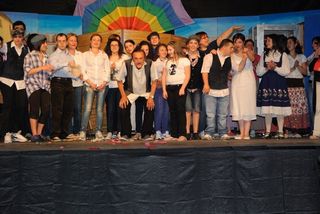Ethics and Morality
Sometimes Good People Do Evil Things
Let's choose to be heroes.
Posted November 6, 2018

Hi! Rose Sword here. My co-author Phil Zimbardo is traveling, speaking around the world about the contents of this article, which we both wanted to share. Not long ago, he gave a TEDx talk in Rome. Like Dr. Suess's Lorax, who warned about the dangers of cutting down all the trees, Phil is known for being the harbinger of social situations that can quickly turn into nearly insurmountable catastrophes if quick action isn’t taken. In his presentation, he laid out how people across the globe are experiencing fear and pessimism about right-wing totalitarian governments that threaten democracy throughout Europe, and in the United States. His antidote: applying social psychology lessons in high schools and corporations to create “everyday heroes.” And he’s optimistic that a new generation of superheroes will be our salvation. The following is a summary of this talk:
The Heroic Imagination Program imparts social psychology lessons to students in schools and staff in corporations to teach people how to stand up, speak out, and take wise and effective action against all forms of evil in their lives.
For over 40 years, all over Europe, countries have dealt with fascism and communism. Now, the new evil—the new threat—is the right-wing, totalitarian parties that are flourishing in Eastern and Western Europe. Occlusion thinking is growing worldwide. For example, Hungarian political leaders say migrants are poison and are not needed. How do they brainwash good citizens to believe this? By dehumanizing others through propaganda and negative media images. In this way, ordinary people accept discrimination against minorities.
And for the first time in several decades, if not longer, America is moving in this direction with President Donald Trump. He has said repeatedly in the past that he wanted a total and complete shutdown of Muslims from entering the country, he turned his back on refugees from war-torn countries, separated children from their parents at the Mexican border, and most recently he has stated he is considering rescinding the right of U.S. citizenship to children born of immigrants in this country. The problem with the ironic thought process behind this rhetoric is all Americans are immigrants unless they are Native American, and sadly many of them live in poverty on reservations. History has taught us that totalitarian dangers toward democracy come gradually but systematically. Let’s explore how this happens.
All evil begins with 15 volts
In 1963, Stanley Milgram conducted a series of studies of blind obedience to authority; one included his “shock box.” For this experiment, Milgram recruited people to play the role of “teacher.” A researcher in a white lab coat represented the authority figure and oversaw the teacher. In another room, an unseen researcher posed as the “learner.” The teacher would "teach" the learner how to improve his performance. Every time the learner made a mistake, the teacher was told to flip a switch on a box and give the learner an electric shock. They began with 15 volts which was increased by 15 volts with every mistake. The ineffectual “shock box” had 30 switches. When the teacher would get to 100-150 volts, the learner would begin to yell and scream.
In every case, the teacher turned to the experimenter in a white lab coat, the authority figure, and said they didn't want to continue, but the experimenter said they had signed a contract and must go on. While the teachers complained verbally, behaviorally they complied. At the end of the box was 450 volts. The question was: Who would go all the way? The sad answer: two out of every three of almost 1,000 participants went to the full extreme of 450 volts. When you flip that first switch, that 15 volts, you are on the steady slippery slope to evil because you know where it could lead.
How totalitarian governments start with 15 volts
Based on the above, we can see how totalitarian governments can take over a democratic nation:
- 15 volts - limited free speech
- 75 volts - control the media
- 135 volts - control the judiciary
- 195 volts - politicians replaced with selected officials
- 265 volts - punish, imprison all critics
- 310 volts - suspend elections
- 385 volts - military or religious rule
- 450 volts - total political domination
We may say a right-wing government is not for us, or that we aren’t that kind of people, but gradually over time, one by one, day by day, month by month, this is what has happened throughout Europe. Last year in Budapest, the government took over Central European University, a private university which must now be called Hungarian Central University and all foreign professors must leave. And similar evils are happening now in the United States.
Four challenges
Throughout the world, we are facing four tests that pose difficult challenges for all of us:
- Expanding inequality gap between the very few rich (about 1 percent) and the increasing number of poor people as well as the diminishing middle class. In the U.S. and many other countries, the middle class is being squeezed out and eliminated.
- Ever-increasing flow of people migrating from war-torn impoverished countries to neighboring nations. The estimation is about 6 million people will try to migrate this year.
- The graying/aging of most societies. As life spans increase, there is a decrease in fertility. In many countries, the fertility rate is declining. For instance, in Japa,n there is a negative fertility rate. This is a new problem for young people.
- Mass migrations from East to West, from South to North, and from farms to cities.
Our world is rapidly changing and we must learn to adapt and make wise choices. Whether we choose for the good of all, or for the good of a few, is up to each of us.
How to inspire heroism
Heroism begins in the mind and is inspired by educating people about social psychology. It starts by rethinking the nature of good and evil and by thinking of yourself as having an inner hero. As individuals, we can start by transforming bystander apathy—which characterizes the bystander effect—into heroic action. The paradox of the bystander effect is: In an emergency situation, the more people who are present, the less likely anyone is to help. What we’ve learned in the past 50 years is that in an emergency situation, as soon as one person helps, then in seconds that help multiplies. HIP's message: YOU should be that ONE!
Heroes are ordinary people who take extraordinary action during challenging situations in their lives. Effective heroes do the right thing when other people are doing the wrong thing, or more often, when they are doing nothing. A hero also exposes evil in all of its many forms as a whistle blower.
In the HIP program, social psychology knowledge is conveyed in six in-depth lessons that answer questions such as:
- How do you transform passive bystanders into active heroes?
- How do you transform people who have a static, fixed mind set into people with a dynamic growth mindset?
- How do you transform prejudice and discrimination into understanding and acceptance?
Other programs are about social conformity, social attribution, and situational awareness of authority power.
What is a hero?
A hero is someone who acts on behalf of others in need or defends a moral cause; a hero is aware of personal risk or cost.
Heroes are generally ordinary, everyday people whose actions in challenging situations are extraordinary. They always disown the label when people say they did a heroic deed, often saying, “No, no. I did what anybody could or would do.”
Heroism creates a positive ripple effect on others who see these good actions; which then spreads – sometimes throughout the world. Conversely, when you see someone doing something bad or evil, it has a negative ripple effect.
How to be a hero
Start with small steps and become an everyday hero in training. Here's how:
Make somebody feel special today. For example, learn their name, look them in the eye, shake their hand, or give them a justifiable compliment.
Ask questions, never follow the rules blindly. We teach our children to obey authority but let’s teach them to obey “just” authority and defy “unjust” authority.
Always ask, what is my ripple effect? What have I done today that will influence other people in a positive way?
Heroes are sociocentric. The enemy of heroism is egocentrism. In other words, when I think about me I'm never focused on you. Let’s consider our new job in life, every day, wherever we go, to make other people feel special. It's not about me; it's about you. Let's change our perspective from me to WE!
What a brighter future looks like:
- Peace replaces war
- Passion rules over fear
- Understanding and acceptance replace prejudice and discrimination
- Heroes dominate villains!
How can this be achieved? Be The One. Be that person who ignores the social norm of doing nothing and creates a new social norm of doing something.




